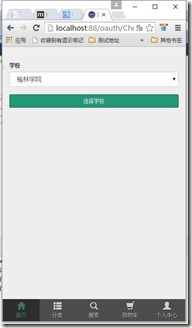
·您现在的位置: 云翼网络 >> 文章中心 >> 网站建设 >> 网站建设开发 >> ASP.NET网站开发 >> 利用DropDownList实现下拉
- 【转载】ASP.NET线程安全与静态变量的生命周期浅谈
- 基于WebForm+EasyUI的业务管理系统形成之旅 -- 数据统计(Ⅳ)
- asp.net判断FileUpload选择的文件是否是图片
- 查看w3wp进程占用的内存及.NET内存泄露,死锁分析
- zip(ICSharpCode.SharpZipLib.dll文件需要下载)
- .Net 2.0 原汁原味读取注册表
- GridView动态添加列并判断绑定数据DataTable的列类型控制展示内容
- Entity Framework中datetime2 to datetime转换错误
- gridview展开嵌套显示
- 设计模式(15)---享元模式
- [小工具]CSS内嵌样式自动提取器
- 如何实现无刷新的DropdownList联动效果
- 使用PagedDataSource类实现DataList和Repeater控件的分页显示
- ASP.NET - 使用 ASP.NET Web 服务器控件(一)
- vs2012使用64位IIS EXPRESS调试
- C# sogou地图API应用总结
- 如何确认访客所在的国家
- DataSet、DataTable、DataRow区别
- 通过代码给IIS增加主机头
- ASP.NET HTTP运行时组成详解
- 好用的ASP.NET 分页类 简单好用 支持 AJAX 自定义文字
- 页面跳转 Server.Transfer和 Response.Redirect的区别
- .NET中实现无刷新客户端联动下拉菜单 (无刷新) (转帖)
- IEnumerable是集合,IEnumerator是集合的迭代器
- ASP.NET无限级扩展菜单UserControl
- REST服务介绍
- 老外的.net与mysql存储过程编程
- 为什么要放弃使用Thread.Sleep
- 浅谈ASP.net处理XML数据
- 第五章SignalR的实时高频通讯
利用DropDownList实现下拉
在视图的Model<Vo>里面我们需要使用IEnumerable来将别的列表的数据全部的转化为下拉列表。下面是关于在项目中实际的写法。
一:实现下拉属性列表的写法
通过使用SelectListItem来自动填充到DropDownList中,形成下拉框。
我们想要在前台页面将数据变为下拉就要用到DropDownList这个特性标签来实现,但是使用的前提是要在Action里面进行设置,对Value和Text进行赋值。
下面是属性的写法,是IEnumerable<>接口类型
public class CreatCustomerView
{
public CreatCustomerView()
{
this.Schools = new List<SelectListItem>();
}
/// <summary>
/// 外键
/// </summary>
[Display(Name = "学校"), Required(ErrorMessage = "不能选择为空")]
public Guid SchoolId { get; set; }
/// <summary>
/// 学校的导航属性
/// </summary>
public IEnumerable<SelectListItem> Schools { get; set; }
/// <summary>
/// OpenId:跟微信绑定的唯一表示,从微信处获取
/// </summary>
public string OpenId { get; set; }
}
写成这样就是想将其Schools放在一个集合里面,而且在上面初始化的时候写成了SelectListItem。
SelectListItem代表System.Web.Mvc的实例的选择项。SelectList类。这里将在Action里面进行相关的设置。
IEnumerable<T>接口类型:这个是实现Foreach遍历所必须的,因为所有的集合和数据都继承自这个接口,并且支持非泛型方法的简单迭代,是集合访问器。定义一种扩展方法,用来对数据集合中元素进行遍历,过滤,排序,搜索等操作。
二:在Action里面的写法
这里就是为其Value和Text进行赋值。
public ActionResult ChooseSchool()
{
var entity = new CreatCustomerView();
entity.Schools = _schoolService.GetAll()
.Where(x => x.Id != Guid.Empty)
.Select(x => new SelectListItem
{
Text = x.Name,
Value = x.Id.ToString()
}).ToList();
return View(entity);
}
首先通过GetALL方法来取出数据库表中的数据,通过Select对其进行赋值,转换为ToList()的形式,在将其传到视图。这里就是为其里面赋值,为将来在前台页面进行Foreach做准备。
三:View视图里面的写法
在视图里面是通过HtmlHelper中的DropDownList来实现的,但是DropDownList的现实要通过下面的三个步奏来实现。

其实就是前面两个步奏中的内容,下面是View中的代码。
@{
ViewBag.Title = "选择学校";
Layout = "~/Views/Shared/_LayoutNew.cshtml";
}
@using System.Runtime.InteropServices
@model ExPRess.Weixin.Web.Models.CreatCustomerView
<div class="header"><a href="@Url.Action("Index","Member")" class="btn btn-link btn-xs pull-left">返回</a>选择学校</div>
@using (Html.BeginForm(null, null, FormMethod.Post))
{
<input type="hidden" value="@ViewBag.OpenId" name="OpenId" />
<div class="col-sm-5 center" style="margin: auto;position: absolute; top: 0; left: 0; bottom: 0; right: 0; ">
<br/><br/><br />
@Html.LabelFor(x => x.SchoolId)
@Html.DropDownListFor(x => x.SchoolId, Model.Schools, new { @class = "form-control" })
@Html.ValidationMessageFor(x => x.SchoolId)
<br/>
<input type="submit" class="btn btn-success btn-sm btn-block" value="选择学校"/>
</div>
}
通过里面的@Html.DropDownListFor(x => x.SchoolId, Model.Schools, new { @class = "form-control" }) 来实现下拉的结果。
四:显示结果

附件:DropDownList知识参考资料 http://www.cnblogs.com/kirinboy/archive/2009/10/28/use-dropdownlist-in-asp.net-mvc.html
- 上一篇文章: .NETDataSet、DataTable操作记录
- 下一篇文章: LINQ数据库技术